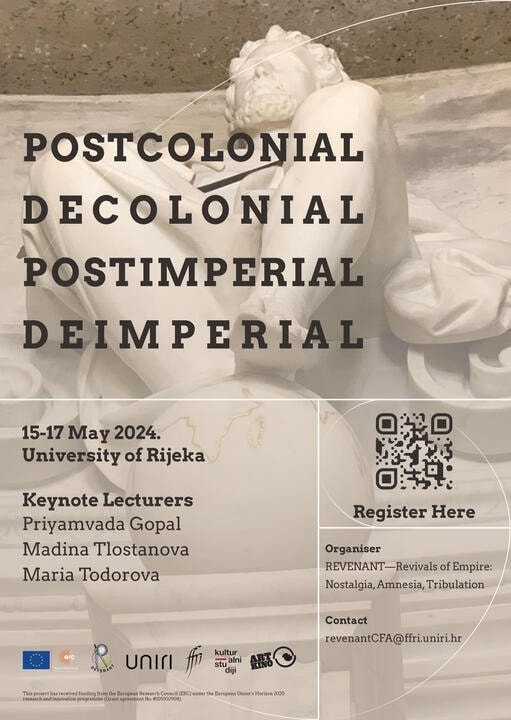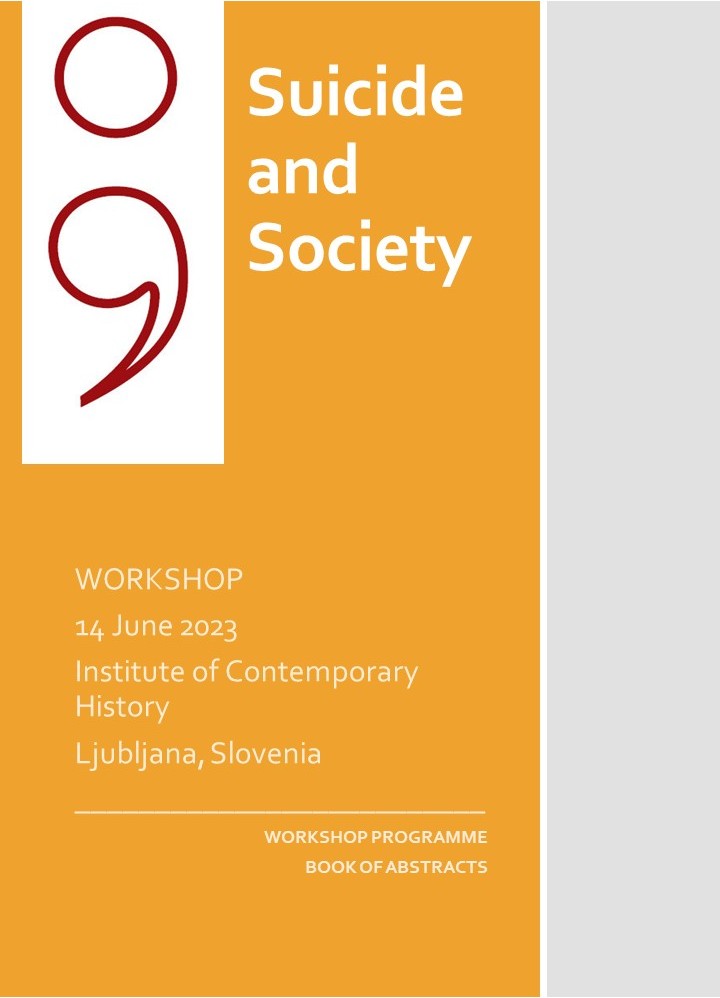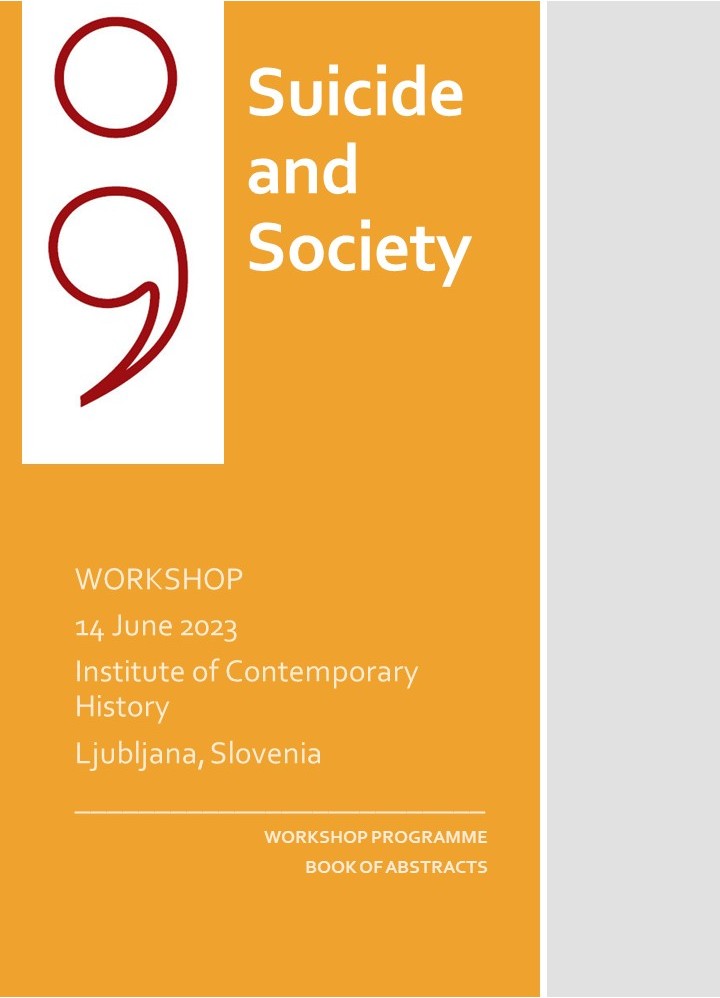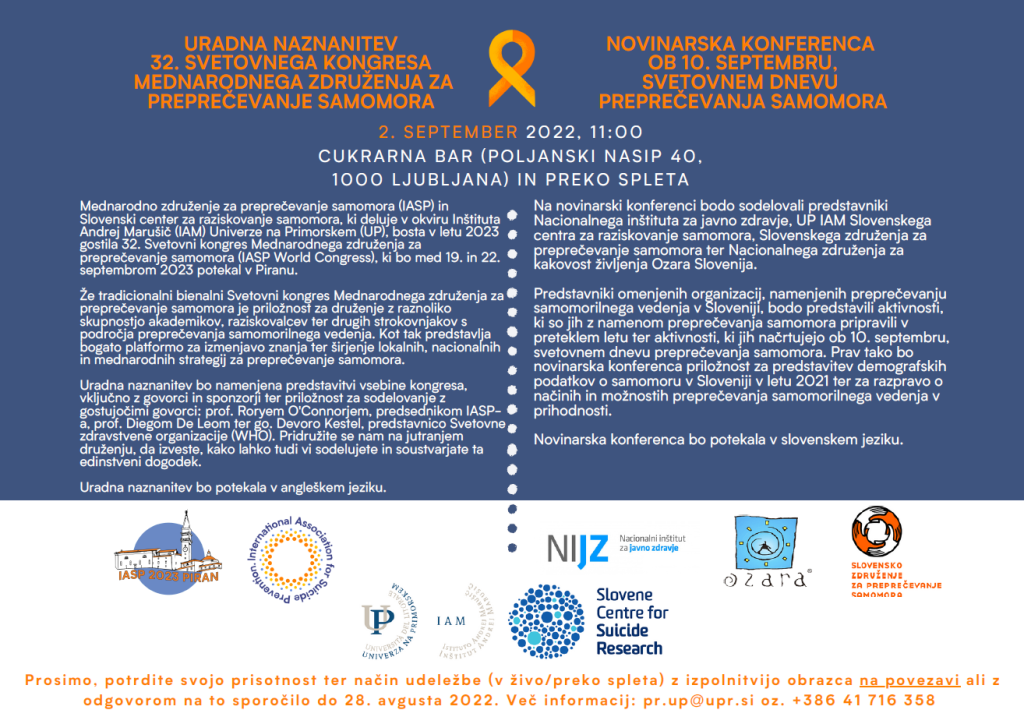Sin, Shame, Symptom: Suicide and Social Change
International conference
You are kindly invited to the International conference Sin, Shame, Symptom: Suicide and Social Change (1850-2000), which will take place on 10. and 11. September at the Institute of Contemporary History in Ljubljana or via ZOOM:
https://us06web.zoom.us/j/84325356981?pwd=ZzXsUzcNCTn3bI7dK5DQ5BQ56ZhY4N.1
DECADE OF DECADENCE: 1914–1924 SPACES, SOCIETIES AND BELONGINGS IN THE ADRIATIC BORDERLAND IN HISTORICAL COMPARISON
Dr. Matteo Perissinotto (58665), collaborator on the project J6-3123 Sin, shame, suicide: suicide and its perceptions in Slovenia (1850-2000), participated in the international conference Decade of Decadence: 1914-1924. Spaces, Societies and Belongings in the Adriatic Borderland in Historical Comparison
POSTCOLONIAL, DECOLONIAL, POSTIMPERIAL, DEIMPERIAL
On 15 May, Dr Jelena Seferović will participate in the POSTCOLONIAL, DECOLONIAL, POSTIMPERIAL, DEIMPERIAL conference, which will take place from 15 to 17 May 2024.
She will present a lecture entitled The Dichotomy of Austro-Hungarian Colonialization: Exploring the Medicalization of Dying and Death in Bosnia and Herzegovina.

Call for papers
Delavnica Suicide and Society
V sredo, 14. junija, bo na Inštitutu za novejšo zgodovino potekala delavnica z naslovom Suicide and Society. Več o dogodku v spodnjem programu in knjigi povzetkov.

Call for papers
Workshop Suicide and Society
On Wednesday, 14 June 2023, the Institute of Contemporary History will host a workshop entitled Suicide and Society. More about the event in the Workshop Programme and in the Book of Abstracts below.

7th International Interdisciplinary Symposium
BIOETIKA I APORIJE PSIHE
Dr. Jelena Seferović will take part in the 7th international interdisciplinary symposium BIOETIKA I APORIJE PSIHE, which will take place in Zagreb between 4 and 5 May 2023.
She will present a lecture entitled:
Methods of taking life by suicide in the context of patients hospitalized in the psychiatric hospital in Pakrac between the two world wars.
The first part of the presentation will deal with the consideration of recent terminological changes related to the act of suicide, which occurred due to a change in its understanding. In the framework of modern theoretical paradigms, suicide is not a criminal act, therefore it is important to pay attention to the language formulation when speaking and writing about this topic. In the second part, will ne presented
quantitative data on the methods of attempted suicide, which were collected during the analysis of the medical records of patients who were hospitalized in a psychiatric hospital on Pakrac between the two world wars. Selected cases will be problematized in relation to the historical and social context of the time, then the age of the patient and his religious orientation and gender. Theories about the concept of suicide from the fields of humanities and social sciences, as well as psychiatric literature, will be used for the interpretation of the collected archival material.

Suicide and Social Change 1867-1968
Maynooth University Workshop 30 March
On March 30, 2023, Dr. Meta Remec will participate in a workshop at Maynooth University in Ireland entitled “Suicide and Social Change 1867-1968”
She will present a paper entitled “From Sin and Shame to an Act of Rebellion: Suicide in Socialist Slovenia.”
Program:
10.00 – 10.45 [online] Orel Beilinson Russian Roulettes and American Duels: Suicide by Bet in Europe, 1850-1950
10.45 – 11.30 Matteo Perissinotto Suicide among Women in Postwar Trieste, 1918-1922
11.30 – 11.45 Refreshments
11.45 – 12.30 [online] Nathan Marcus Suicides and Attempted Suicides during Hyperinflation: Vienna, 1921-1922
12.30 – 14.00 – Lunch (Bistro 53, Maynooth)
14.00 – 14.45 – Gabor Csikós Mental Health and Suicide in Rural Hungary under State Socialism
14.45 – 15.30 – [online] Meta Remec From Sin and Shame to an Act of Rebellion: Suicide in Socialist Slovenia
Dr. Jelena Seferović :
“Other claim that nothing can be found out withouth a gipsy women”: Qualitative analysis of interpretations of suicide in the late 19th and early 20th centuries”
Dr. Jelena Seferović will have the following presentation at the symposium “Karlovački bioetički susreti – zdravlje od rođenja do smrti”, which will be on Friday, December 2, 2022:
“Other claim that nothing can be found out withouth a gipsy women”: Qualitative analysis of interpretations of suicide in the late 19th and early 20th centuries”
The presentation is based on the research of newspaper articles about suicides that were published at the end of the 19th century at the beginning of the 20th century The question of suicidal intentions, attempts and the committing of suicide was also considered in the context of the psychiatric discussions that were published in “Liječnički vjesnik” in the aforementioned period.
Considering the interpretations of the causes of suicide by the authors of newspaper articles, it was observed that they most often brought in connection with the individual’s inability to satisfy traditional patriarchal and religious norms of the community, but also with the time that the community failed to meet his expectations and needs. Psychiatric analyzes of suicidality were based on the presentation of quantitative statistics information about the way in which the suicide was committed and the effort to interpret it with reference to that time current psychological and biological theories and social and economic circumstances of the lives of individuals who are attempted or committed suicide. But for those psychiatrists who referred to the “general laws of life”, that the act was nothing but “an unnatural phenomenon, an anomaly”. It is obvious that it was equally difficult for laymen and experts at the time to figure out the causes of the occurrence of suicides ideas, attempts and realization of the suicide itself. Therefore it is not surprising that the answer to that question was sometimes sought from someone who possibly has an insight into the transcendental and has some special spiritual powers, that is, from a “gypsy woman”.




